Australian Tumbleweeds
Fisk: Going Down to Browntown
So we waited an extra week just to make sure we weren’t imagining it but yes, it seems that season two of Fisk is just as good – if not better – than the first. Phew.

Some things have changed: the downstairs coffee shop is now an even more infuriating “blended beverage” venue. Roz (Julia Zemiro) has decided her true calling lies in mediation rather than law (don’t worry, she’s not leaving the office). But it’s still the adventures of the perpetually mildly exasperated probate lawyer Helen Tudor-Fisk (Kitty Flanagan) as she deals with a stream of dingbat clients and a world that seems intent on frustrating her at every turn.
After years of failed dramedy and snippet sitcoms that forgot to be funny, Flanagan and company make it all look so easy. A handful of distinct characters in a set location where they can bounce off each other? A format that introduces a couple of guest stars each week to drive storylines and provide variety? A cast of people who are funny and are given funny things to say and do? Why don’t we have a dozen series this good every year!
But unlike almost everyone else making sitcoms for the ABC, Kitty Flanagan knows what she’s doing. She’s great when it comes to pointing out the absurdities of modern life and of certain types of characters. But instead of just setting up cliched characters and having their existence be the punchline in a “we’ve all seen this guy, right?” kind of way, the jokes come from the dialogue. Which is to say, there’s loads of funny lines on top of everything else.
Just as importantly, she has an actual comedic point of view on the things she observes. Fisk is annoyed by a lot of stupid shit, because a lot of shit really is stupid. Ok, yes, gaming chairs don’t usually explode and breakfast soup isn’t a real thing (yet). There’s a fun streak of silliness running through Fisk too.
It’s not an angry show either. Fisk’s annoyance is at life itself, which is full of obstacles and weirdoes and trendy drinks with names like “greengasm”. Social media influencers might be bizarre and a pain, but that’s not a problem in itself. Fisk would just rather they do their thing somewhere away from her so she can get on with important things like ordering a brown burkini online.
And the tone across the series is pitched just right. The guest stars get to be broad caricatures because they’re here for a good time not a long time. The core cast are all just plausible enough to be believable people while also being well-defined enough that they strike (comedic) sparks off each other.
Of course Ray (Marty Sheargold) and office dogsbody George (Aaron Chen) would share a love of comfy seating while Fisk can’t even get couch privileges. Ray – and everyone else – might suffer under the authoritarian thumb of Roz, but there’s still a sibling bond there that goes deeper than getting an air fryer in the office.
Running a blog looking at Australian comedy is a lot like crawling in circles in the desert: you see the same crap over and over again and it never gets any better. So you might be thinking “hey Tumbleweeds, tone it down a little would you? Clearly the lack of any decent sitcoms in living memory has driven you loco”.
Nope: Fisk really is that good. It’s a comedy that’s a delight to watch, and we’re delighted by it every week.
Outta the Way, Gramps
Wil Anderson has a new book to promote, and we all know what that means: talking about ways to get more young people on the ABC! Wait, what?
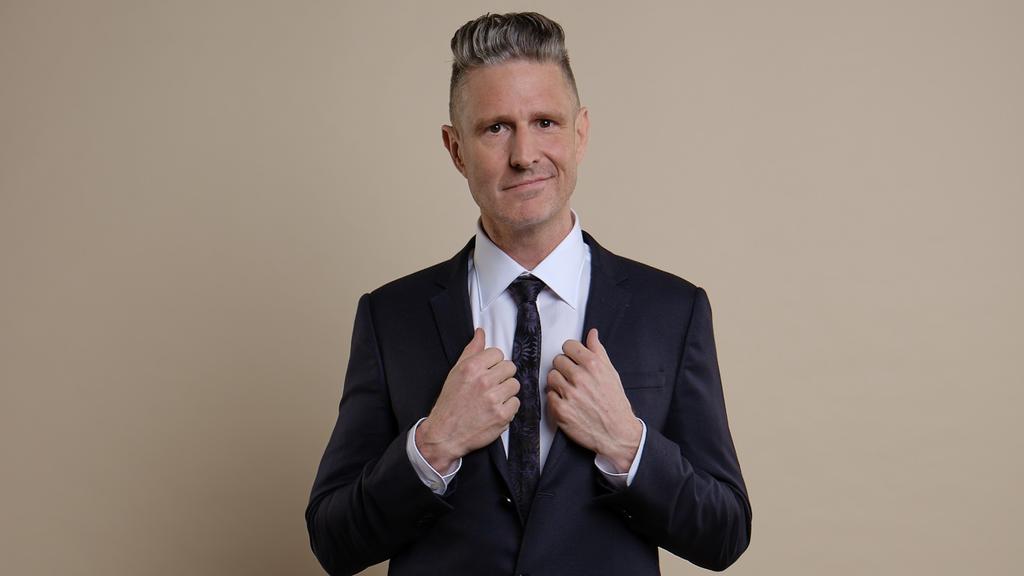
In a feature headlined “Wil Anderson’s bold solution for the ABC’s youth problem” – presumably the bold part is that he’s not offering to give up any of his own air time, but more on that later – he suggests the solution to the lack of young presenters on the ABC is to hire more young presenters. Genius!
No wait, we read that wrong – it’s to give him a new show:
Wil Anderson has a proposition he’d like to make to the ABC: Let him come in and oversee five nights a week of late-night TV hosted by young comedians.
“Let’s make something,” he says. “Let’s get all these young people and give them more shows and do something in a slot – I don’t care where it is, it could be 10.30 on a Friday night, or we find a channel and we do it every night — let’s just invest in people.”
Some people might think that hang on, doesn’t Wil Anderson already host two series on the ABC? Maybe the way to get more people who aren’t Wil Anderson on the ABC is to have less Wil Anderson on the ABC? More fool you, because he’s already thought of that:
“I guess the argument could come back in the other direction: ‘Well, you’ve been there forever, why don’t you f— off?’,” he says. “Well, here’s why. I am only on TV for 10 hours a year. So it’s not a huge amount. I already don’t do a lot.
“But if I go, they’re not replacing me with Aaron Chen, that’s the truth. So the best work I can do is try to create something where I can put those people on the show.”
Interestingly, this is the exact opposite argument to the one Shaun Micallef made when he quit Mad as Hell:
As Mad as Hell is not currently being hosted by Aaron Chen, Anderson may well have a point.
Anderson’s “10 hours” argument makes sense from his side of things, where he has a couple of part time gigs at the ABC for a few months each year. From the point of view of pretty much everyone who isn’t Wil Anderson, he’s currently hosting two comedy panel shows on the ABC, which is one more than anybody else and two more than 99.95% of the funny people in this country.
To be fair, he’s not suggesting he actually host this new talent showcase. He’d just be some backstage puppet-master the new talent would listen to or something… it’s a little vague. Because if he’s not hosting, then why is he involved? Isn’t the whole idea of new talent to get new ideas out there?
The obvious model for what Anderson is suggesting is a mentoring role. Something akin to what Denton did with The Chaser and Hungry Beast. But back then Denton already had his own production company – the company that, after a few mergers and with Denton long gone, still produces Gruen. If those guys want to produce a young talent showcase, go for it. If Anderson’s not hosting, and the new talent is providing the talent, it’s hard to see exactly where he fits in.
(and if Anderson did host, chances are it’d just be another version of Question Everything, where the occasional fresh face is given the chance to show they can fit in seamlessly with a bunch of comedians twice their age so the audience isn’t startled by any jokes that aren’t old enough to drive)
As a host, Anderson’s been remarkably committed to the ABC. Andrew Denton and Shaun Micallef went to commercial networks for extended periods. Adam Hills went overseas for years. Anderson stayed put: these days he’s the jokey, fun-loving face of the establishment.
Yeah, he smokes dope and takes swipes at authority. Remember when he used to host The Glass House two decades ago? The ABC audience has grown up with him and now they’re 50 year-old homeowners, just like he is. He’s been hosting a series on ABC television almost every year since 2001: his on-air career is older than some of the up-and-coming comedians trying to get a gig on the ABC.
The truth is that to achieve the goal of “more young people”, the ABC is going to have to get rid of some of the old people*. Even if there was a new talent showcase, everything else on the ABC is hosted by people who’ve been there for a decade or more. You know, like Wil Anderson.
For this system to really make a difference, new comedy talent is going to have to move up the ranks at the ABC, not just vanish when their show gets axed. If Anderson sticks around until retirement age – or even just Fran Kelly’s age – that’s another fifteen years where a top hosting job isn’t going to a young person.
It’d be great if the way to get more young people doing comedy on the ABC was to expand the size of the pie. Maybe one day the ABC will have enough money to do that. But after decades of LNP leadership focused on freezing or cutting budgets, the ABC that gave a twenty-something Wil Anderson his start is gone. If young people are ever going to get a seat at the big table, someone there is going to have to step away.
Anderson’s heart is clearly in the right place, and pretty much everything he’s arguing for has merit. The part that doesn’t is the part where he’s involved.
.
*haha, as if
Coming soon!
Two new comedies have been announced this week: Colin From Accounts and We Interrupt This Broadcast.
Colin From Accounts, available from 1st December on Binge, stars Patrick Brammall as Gordon and Harriet Dyer as Ashley, who are brought together when Gordon accidentally injures a dog. Based on the trailer, this looks like the kind of rom-com/dramedy Hollywood used to churn out by the dozen. Expect occasional comic scenes and the mild peril of will- they-won’t-they.*
In more interesting news, Seven unveiled their 2023 upfronts last week, including the rumoured new sketch show We Interrupt This Broadcast:
Get ready, Australia. We Interrupt This Broadcast is a long-overdue comedy series that makes fun of Australia’s favourite (and least favourite) shows. As the world grows ever more self-serious, We Interrupt This Broadcast promises to reboot and revitalise a long-standing and near forgotten Australian tradition: taking the piss out of everything, including ourselves! With our televisions, computers and phones creating the white noise we now call content, there’s no shortage of stuff for this irreverent, accessible and occasionally absurd series to lampoon. Showcasing some of Australia’s most versatile comedy talents, including Christie Whelan Browne, Bridie Connell, Michelle Brasier, Adele Vuko, Duncan Fellows, Greg Larsen, Ben Russell and Bjorn Stewart, We Interrupt This Broadcast is produced by Helium for the Seven Network.
With alumni from Mad As Hell, Tonightly, Aunty Donna and At Home Alone Together on board, We Interrupt This Broadcast has potential. But whether it’s a good program or not will depend on whether Seven is prepared to let the team do interesting things. Phrases like “occasionally absurd” and “accessible” do not bode well in that regard.
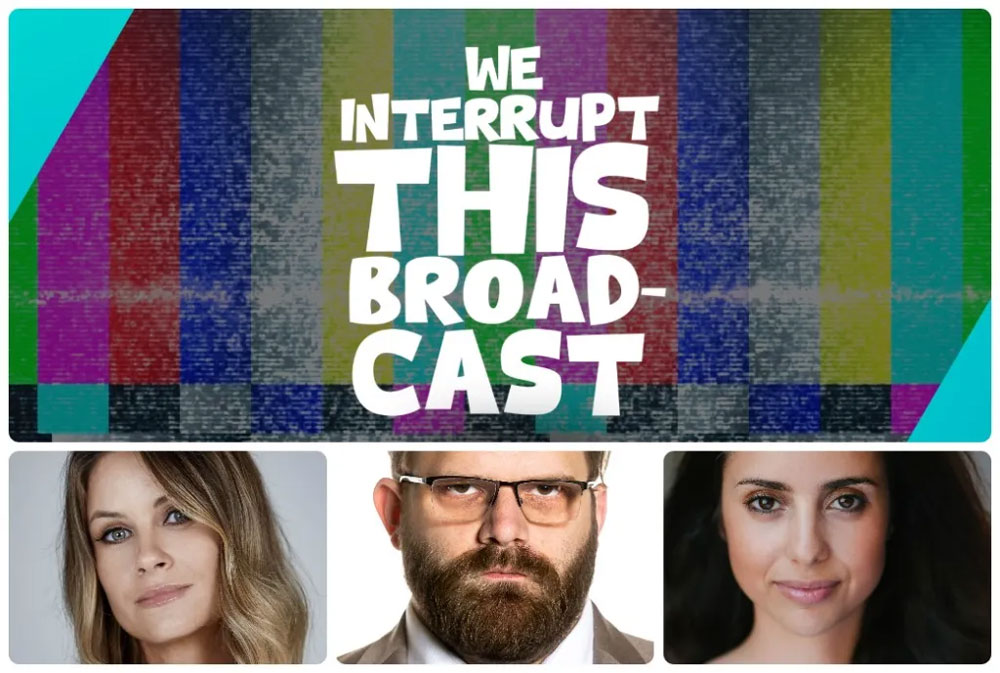
Seven has a solid legacy of sketch shows – Fast Forward, Full Frontal, Kinne – but these all relied far too heavily on parodies of TV shows, catchphrase comedy and repeated sketches. What we don’t need is another sketch show spinning a half-arsed parody of a reality show across multiple episodes. Especially if the only real joke in that parody happened in the first half of episode one.
Sketch comedy is a rarity on Australian television now, so we’re pleased by this announcement and wish the cast and crew well. It’s just…please don’t fuck this up!
* They will.
Vale Summer Love
Summer Love ended last week with a teenage girl crying on a beach after a friend of hers died of cancer. Hilarious! Australian comedy is back, baby.
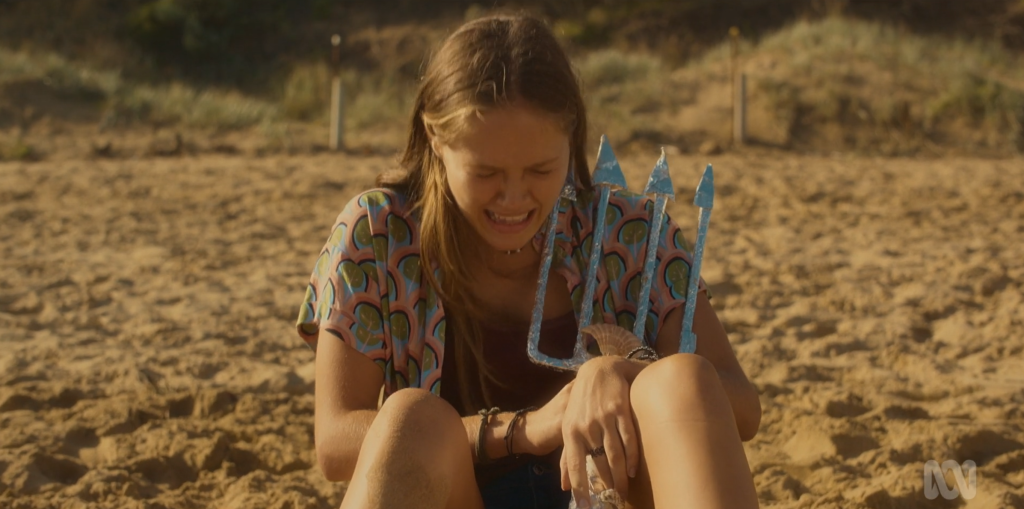
Summer Love is a tough one for us to cover, because despite having all the external trappings of a sitcom – half hour episodes, a consistent situation, comedians in front of the camera and writing the scripts – it turned out to be the kind of show where the laughs were an occasional byproduct rather than the whole point.
Yes, some episodes were funnier than others. As we predicted, both the one from Wayne Hope and Robyn Butler, and the one co-written by Nath Valvo, were a fun mix of mild drama and comedy. But overall the scales were tipped towards a kind of wry low-key storytelling that makes us think of short stories in summer reading editions of newspaper weekend supplements.
So if you’re looking for tales of relationships starting to fray, or siblings reminiscing about a carefree childhood that now seems so far away, Summer Love was for you. Those looking for laugh out loud comedy, wacky characters, or off-the-wall situations… yeah, keep searching.
(and it seemed a little… odd… that a large beachside house during summer wasn’t being rented by teens as a party venue every single weekend)
Yes, this is a series that definitely could have used a lot more vomiting and drunken debauchery. But even with that off the table, is this the kind of thing the ABC should be doing? Of course. In fact, we’d say they should be doing even more of it.
There’s more to drama than just dead bodies in small towns and tight-knit communities torn apart by a disaster – oh wait, they’re the same thing – and the ABC really should be looking further afield for stories and scenarios when it’s time to greenlight a bunch of new drama.
So is this the kind of thing the ABC should be doing instead of comedy? Fuck no. Even by the ABC’s already anemic standards for scripted comedy, this wasn’t good enough. It was a well made light drama series and the ABC should make more like it. But as a comedy, it just didn’t deliver the goods. Most of the time, it wasn’t even trying to.
And yet, this was the only all-new scripted comedy series on the ABC in 2022. Having seen the whole series, calling it a comedy is being extremely generous. Yes, sometimes it was funny – but even then it was the kind of low-key, quirky character comedy that, sure, gets the occasional smile.
But not much more.
AACTA awards nominations 2022
The nominees for this year’s AACTA awards have been announced, and when it comes to comedy, it’s a mixed bag of one or two good nominations, a whole lot of terrible nominations, and some odd omissions.
AACTA Award for Best Comedy Program
Aftertaste
Five Bedrooms
Hard Quiz
Mad As Hell
Spicks and Specks
Summer LoveAACTA Award for Best Comedy Performer
Wayne Blair, Aftertaste
Patrick Brammall, Summer Love
Harriet Dyer, Summer Love
Tom Gleeson, Hard Quiz
Charlie Pickering, The Weekly with Charlie Pickering
Doris Younane, Five BedroomsAACTA Award for Best Stand-Up Special
Geraldine Hickey: What A Surprise
Ronny Chieng: Speakeasy
The Melbourne International Comedy Festival 2022 Gala Supported by Oxfam
The Melbourne International Comedy Festival 2022 Opening Night Comedy AllStars Show
Tom Ballard: Enough
Tommy Little: I’ll See Myself OutBest Digital Series or Channel
A Beginner’s Guide to Grief – Renee Mao, Julie Byrne, Kate Butler, Linda Ujuk, Anna Lindner
Black As – Joseph Smith, Dino Wanybarrngu, Chico Wanybarrnga, Jerome Lilypiyana, David Batty
Iggy & Ace – A.B Morrison, Monica Zanetti, Melissa Kelly, Hannah Ngo
It’s Fine I’m Fine – Clare Delaney, Iain Crittenden, Florence Tourbier, Stef Smith
Jimmy Rees POV – Jimmy Rees
Ozzy Man Reviews – Ethan Marrell
People who worked on comedies also got a few nominations in the production categories…
AACTA Award for Best Original Score in Television
Aftertaste – Episode 3, Benjamin SpeedAACTA Award for Best Sound in Television
Aftertaste – Episode 3, Michael Darren, Pete Smith, Josh Williams, Leah McKeown
Summer Love – Episode 1, Scott Findlay
…but nothing in the direction category.
AACTA Award for Best Direction in Drama or Comedy
Bump – Episode 1, Geoff Bennett
Heartbreak High – Episode 1, Gracie Otto
Love Me – Episode 4, Emma Freeman
Mystery Road: Origin – Episode 3, Dylan River
The Twelve – Episode 9, Daniel Nettheim
And in case you’re wondering who decides the nominations, and will decide the winners:
Voting is exclusive to AACTA members, with members drawn from every sector of the screen entertainment industry including Free-To-Air Television, Streaming/SVOD/Subscription Television, Online/Digital, and Film and Documentary.
In a further expansion of our voting process, and to continue to ensure a broad and diverse cross section of voices and lived experience contribute to our awards, all AACTA members – Professional, General, and Youth – will vote on the nominees and winners across all major Award categories. Our General membership is inclusive and open to people from all backgrounds, including those that may be facing systemic barriers to their professional development, and we welcome their contribution to the conversation around our culture and creativity.
The determination of Technical Craft nominees and winners across TV, Film and Documentary is limited to Professional members with relevant craft accreditation. Professional members are invited to submit their interest to join a branch in line with their experience and accreditation.
It’s good to see there’s a diverse bunch of people making the choices, but what percentage of them knows anything about comedy, we wonder…?
The ABC: Young people need not apply
Turns out the ABC has given heaps of young people opportunities recently! And not almost none like you thought. An article published on TV Tonight yesterday lists them all:
Kurt Fearnley’s One Plus One, interview show hosted by Fearnley when he was 39.
Courtney Act’s One Plus One interview show hosted by Courtney Act.
The Set music show hosted by Dylan Alcott and Linda Marigliano.
Win the Week quiz show hosted by Alex Lee.
Tonightly, comedy / variety hosted by Tom Ballard.
Aaron Chen Tonight, comedy show hosted by Aaron Chen.
A Dog’s World factual series presented by Tony Armstrong.
India Now, Stuff the British Stole, The School that tried to End Racism, presented by Marc Fennell.
Q+A, forum show previously hosted by Hamish MacDonald at 39.
Good Game: Spawn Point gaming show hosted by Angharad “Rad” Yeo, Gemma “Gem” Driscoll.
BtN, news for kids hosted by Amelia Moseley and Jack Evans.
Question Everything, co-hosted by Jan Fran.
When you have to include people who were 39 when they started on the ABC, or hosted shows which were axed five years ago, or started out as hosts on other networks, you know there’s a desperate argument being made.
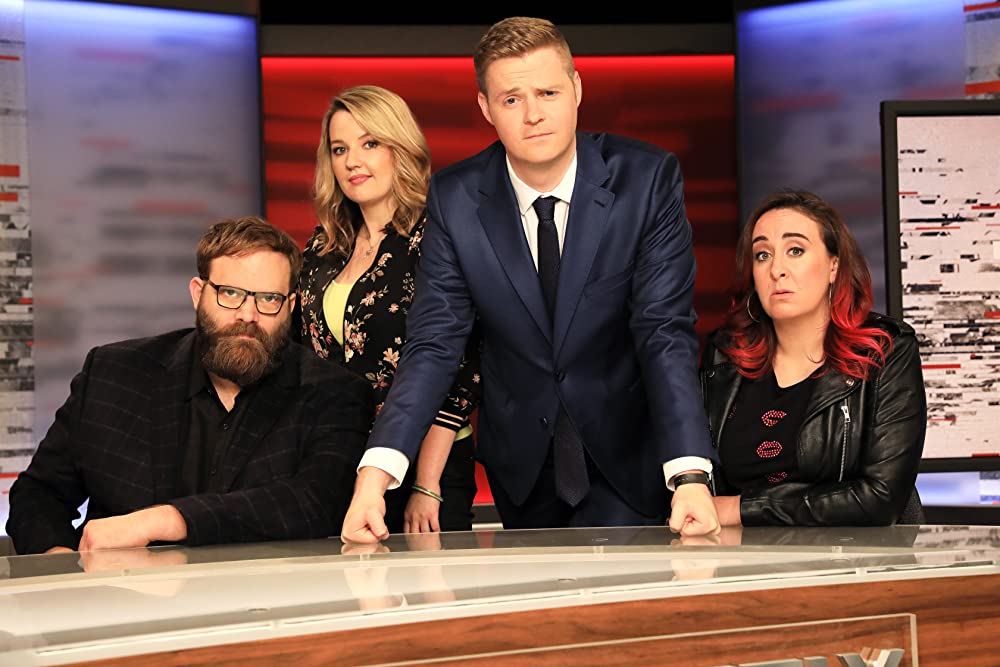
And, yes, we know things are difficult for the ABC right now. The article rightly mentions how years of budget cuts have prevented the ABC from commissioning shows featuring new talent:
After previous governments impacted ABC funding, the broadcaster publicly stated it would no longer commission shows to screen after 9:30pm. It’s largely stuck to that rule, with a few exceptions.
But post 9:30 was previously a playing field for younger talent to develop ‘off Broadway.’
Emerging comedy acts such as The Chaser and a young Wil Anderson in The Glass House began life in 9:30 slots or later. Looking further back, so did names such as Rob Sitch, Santo Cilauro, Marg Downey, Michael Veitch, Magda Szubanski and Tom Gleisner in The D-Generation.
The former comedy channel was also home to Tom Ballard’s Tonightly and ABC2 for a young Aaron Chen. In primetime there are less chances to take risks on new comedy acts, although Question Everything is adding some to its panel.
Wow. “Adding some to its panel.” That must be a great comfort for any newcomers out there trying to get on TV.
It’s not hard to see why talented younger people feel cheesed off at the lack of opportunities. Or why this story isn’t going away.
The mention of ABC2 is also interesting – five years ago (which is when Aaron Chen Tonight aired), there was a clear policy of shifting the obvious “young people” shows over to what would become ABC Comedy (and is now ABC TV Plus). There they rated poorly, were axed, weren’t replaced, and the whole channel went repeats-only as far as local content goes.
At a guess, we’d say the problem was that when the then LNP government started seriously cutting back on ABC funds, ABC2 (and youth programming in general) were seen as the easiest stuff to cut. Especially as ABC management were willing to shuffle their priorities to suit Canberra.
A plan to give opportunities to younger hosts was there. Problem was, it was set up to fail in an era of declining funding. In the battle between regional coverage, a rusted-on older audience and Australia’s youth, the kids were always going to go under the bus. Shifting their programming to ABC2 just made it easier to do out of sight.
But now that there’s a Labor government, and more funding is (presumably) on the way, how should the ABC deal with this? Well, a better tactic than some desperate PR would be for the ABC to commission some shows hosted by people in their 20s and commit to airing them for more than a couple of months. Or reduce the number of shows it makes aimed at older audiences thereby releasing funds for new programs fronted by young people.
Keeping on making shows aimed entirely at an ever-ageing audience is not a viable long-term strategy. Unless irrelevance and obsolescence is the ABC’s goal.
The Hostest With the Mostest
Earlier this week the ABC sent Tom Gleeson to the Australian Museum in Sydney. Initially we were excited, then we realised this wasn’t going to be a remake of 90s monster movie Relic and he wasn’t going to get eaten by a dinosaur. C’mon Aunty, even a cheap knockoff of Night at the Museum would have been better than this.
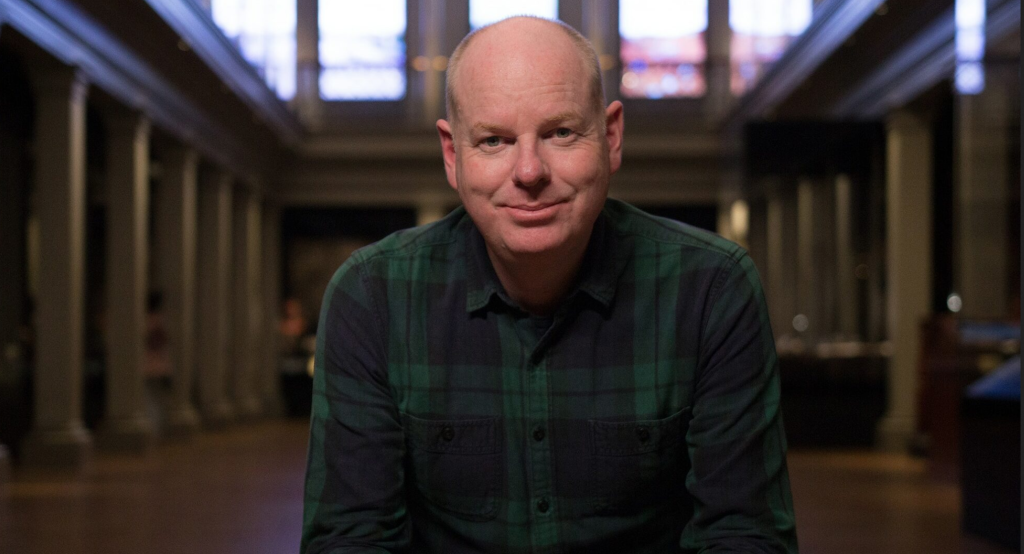
Don’t worry if you missed this chance to see one of Australia’s… let’s go with “best known” comedians wandering around someplace mildly incongruous, because the ABC’s got you covered: on November 1st they’re airing Magda’s Big National Health Check, in which she goes door-to-door giving prostate exams or something.
Remember when comedians used to host comedy programs? Not at the ABC they don’t. If Tom Gleeson wants to be funny*, he can do it on his own time: if Magda wants to get her face back on the ABC, she’s got to cough up a lung to do it.
With all the ongoing kerfuffle about how the ABC clearly has zero interest in investing in new comedy talent, these two shows are… well, not exactly a slap in the face, but another sign of exactly what’s going wrong at the national broadcaster.
Imagine a glass of water. The level of water in the glass is your level of popularity. Comedians have a big advantage here: being funny is something people like. When a comedian is funny in the public eye, water is tipped into the glass and their level of popularity goes up.
Hosting shows like this, on the other hand, does not make you more popular. The idea here is to use your already existing popularity to make something unpopular – museums, health checks – more interesting. Water from your glass is tipped into the subject’s glass.
What the ABC is doing, is saying to comedians “we won’t give you the chance to become more popular by airing shows people might enjoy, but we will use your popularity to make the boring shit we want to show more popular, thanks for the glass of tasty water”. You wouldn’t say they’re exploiting these comedians, but you wouldn’t want to rule it out entirely either.
The ABC used to get shitty if their home-grown stars left for commercial television. Both Andrew Denton and Shaun Micallef have talked about how, once they took up a commercial offer, the ABC shunned them for the next few years.
Presumably to avoid this issue, the ABC have now decided to not risk the nightmare of creating any further home grown stars, and will only let the stars they do have work on boring programs nobody wants to watch. Thanks guys.
To be fair, occasionally a sexy weatherman or nutty gardener will somehow get some traction in the wider community. But you don’t see them getting an one-hour prime time special where they’re rummaging in the bins behind Australia’s Top Transplant Hospital, do you?
.
*yeah, we know
Music Makes the People Quiz Together
One door closes, another door opens: Spicks and Specks has finished up (for 2022 at least), and now RocKwiz is coming back. Remember when nostalgia wasn’t such a big deal? Those were the days.
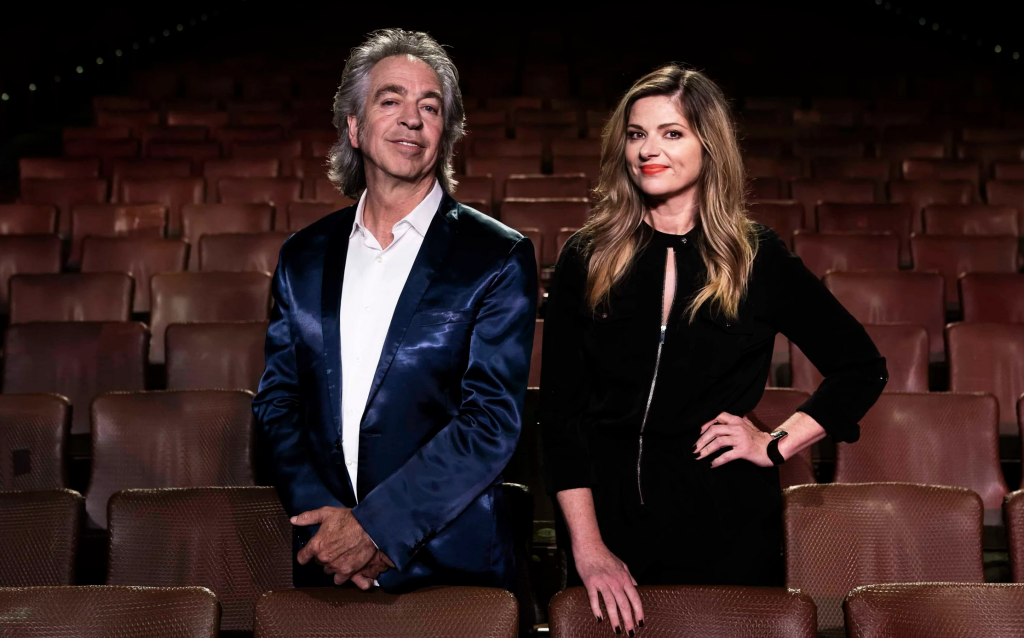
The RocKwiz return has a surprise twist. It’s not coming back to SBS, where it aired for over a decade, but Foxtel, which is still operating despite general apathy.
Former SBS music trivia show RocKwiz will make a comeback in 2023 with new episodes commissioned by Foxtel after seven years off air.
Host Julia Zemiro, adjudicator Brian Nankervis, human scoreboard Dugald, and a new look RocKwiz Orkestra will all feature on a new look set in 30-minute episodes filmed in front of a live studio audience.
The new RocKwiz Orkestra will feature Peter Luscombe (Musical Director and drums), Clio Renner (keyboard and backing vocals), Bill McDonald (bass guitar), and Olympia (lead guitar and backing vocals).
Eight episode will see RocKwiz hosts and Orkestra joined by contestants and two surprise musical guests who will each perform solo before finishing the episode in the traditional RocKwiz duet.
This seems like one of those increasingly popular moves on Australian television where everything makes sense right up until you get to the part where the show is meant to attract an audience.
SBS axing RocKwiz made sense. They already had eleven years worth of episodes of a nostalgia-based music quiz that wasn’t going out of date any time soon. Guess you can have too much of a good thing.
Foxtel bringing it back also makes sense. They need (cheap) local content as part of their licensing requirements, and this has a proven format and name recognition. Who knows? It might even attract a new subscriber or two.
Haha only kidding. Nobody’s subscribing to their massively overpriced service for eight episodes of a quiz show. Maybe people will stream it. Maybe it doesn’t matter if anyone actually watches it. It’s back, take it or leave it.
At least when the ABC decided to bring back Spicks and Specks it was pretty obvious what they were doing. When it comes to light entertainment, the ABC has given up on trying to build an audience*. Now it’s time to hold onto the viewers they do have, and that means nostalgia and plenty of it.
When Spicks and Specks began, Adam Hills was an up-and-coming presenter, Myf Warhurst was a credible music commentator, and Alan Brough was a working comedian who liked music. A typical line-up for a show on a network that still made new things.
Now they’re all legacy characters, people who are on Spicks and Specks because… they’re on Spicks and Specks. The show used to tap into nostalgia. Now it’s nostalgia itself, a thing where the idea is that even new episodes feel like repeats.
The show itself has strengths and weaknesses – more weaknesses than strengths at 50-odd minutes, and it’s not helped by the way Australian music (and music around the world) has moved away from the kind of band / performer driven product the show champions – but it’s now a cozy slice of yesteryear no matter how relevant or successful the musical guests might be.
Any criticism would be beside the point anyway. This isn’t the fun musical quiz people loved a decade ago. It’s a hollow reminder of that show, 50 minutes of “remember when?” Even if it somehow managed to become a fast-paced and snappy comedy quiz – and it can’t, because the original wasn’t really that – it wouldn’t matter, because the whole point now is to dwell on the past.
Let’s put it this way: on the original, up-and-coming musicians were just “musicians”. Now they’re actively positioned as “young people”, there to provide insight into a world the audience has left behind.
If only Spicks and Specks had stayed part of that world instead of clogging up this one.
.
*whatever you think of ageism on Australian television, the ABC giving their first late(ish) night talk show in years to 64 year-old radio host Fran Kelly is definitely some kind of statement as to where their priorities lie
Kind of a Bummer, Love
In the midst of the recent kerfuffle about the ABC’s lack of fresh comedy faces, one series was noticeably left out of the conversation: Summer Love. Which is odd, as it’s the one ABC series in recent years that’s gone out of its way to provide opportunities to up-and-comers.

While it’s a Gristmill production and they’ve been around for a couple decades now, the line-up of writers and actors has been heavily skewed towards those stepping into new roles. Even the episodes featuring familiar faces have usually also been written by those faces… well, not literally by the faces but you know what we mean.
Even the press release used the whole “emerging talent” thing as a selling point:
Screen Australia’s Head of Content Sally Caplan said: “We’re thrilled to support the powerhouse creative team of Wayne Hope and Robyn Butler in delivering this irrepressibly Australian series. They have assembled a stellar array of emerging and established diverse writing and acting talent and we look forward to seeing this well written and inclusive drama brought to life.”
So you’d think this would be a halfway decent counterpoint to the whole “where are the young comedians?” argument of a week or so back. “Look, there they are!” Case closed, everyone can go back to pretending Wil Anderson is the young fresh face of Australian comedy or whatever.
Obviously this didn’t happen. Partly that’s because by “young comedian”, many of those speaking up really meant “young TV hosts”. Writers and actors? We get them from Hollywood, right?
For most people these days television is just a place where people stand around talking directly to them. Newsreaders, reality show hosts, panel show guests, talking heads on current affairs programs, sports commentators, someone standing in front of the interesting stuff during a documentary, stand-up comedians. That’s television. You know, radio with pictures.
In Australia, giving creative new talent a place to express and develop their talent just isn’t a cultural or economic priority. Television is for people who want to be on television. If the ABC isn’t giving young people a chance to be on television, then the people who want to be on television – but currently have to make do with lesser forms of celebrity like social media or newspapers – aren’t going to be happy.
But the real reason why nobody mentioned Summer Love is because Summer Love isn’t funny. It’s the kind of show where any flashback – especially one featuring a character who isn’t currently part of the story – fills the home viewer with dread because there’s a very good chance that character is now dead. Relationships are a source of conflict and drama, not laughs. Quirky moments of bonding are the best you’re going to get.
Want to train writers and actors to be funny? Give them a sketch comedy series. Even the ABC knows this: see the semi-recent Black Comedy. Summer Love definitely should have been part of the conversation on why the ABC isn’t nurturing new comedy talent, but only because it’s exactly the kind of show you make when you don’t actually want new comedy talent.
Summer Love is perfectly fine for what it is. But what it is, isn’t going to lead to a new generation of comedy writers and performers. It’s a little hard to see exactly what it will lead to, though it may very well get a second season; the ABC doesn’t make character focused dramedy, or much of anything scripted that doesn’t involve a series of murders in a small town.
The ABC isn’t going to come out with the truth, which is that they’re not giving younger talent hosting opportunities because their audience doesn’t want to watch younger talent hosting their shows. Instead, the ABC is going to give younger talent the opportunity to make the kind of mild, “serious” dramedy that older viewers like to watch. Anyone hoping for the return of The Factory or Recovery or even The Money or the Gun is shit out of luck. But Summer Love?
Like the song says, “Well, I’m a freak ya right each and every night”.
Third Time’s the Harm
Wog Boys Forever is not, as you might occasionally wonder while watching it, an indication of the film’s run time. The “forever” is presumably meant to inject a note of triumph into proceedings – wog boys will never die! But the overwhelming feeling after this third visit with hot car-loving, leather jacket-wearing Steve Karamitsis (Nick Giannopoulos) is that sometimes dead is better.
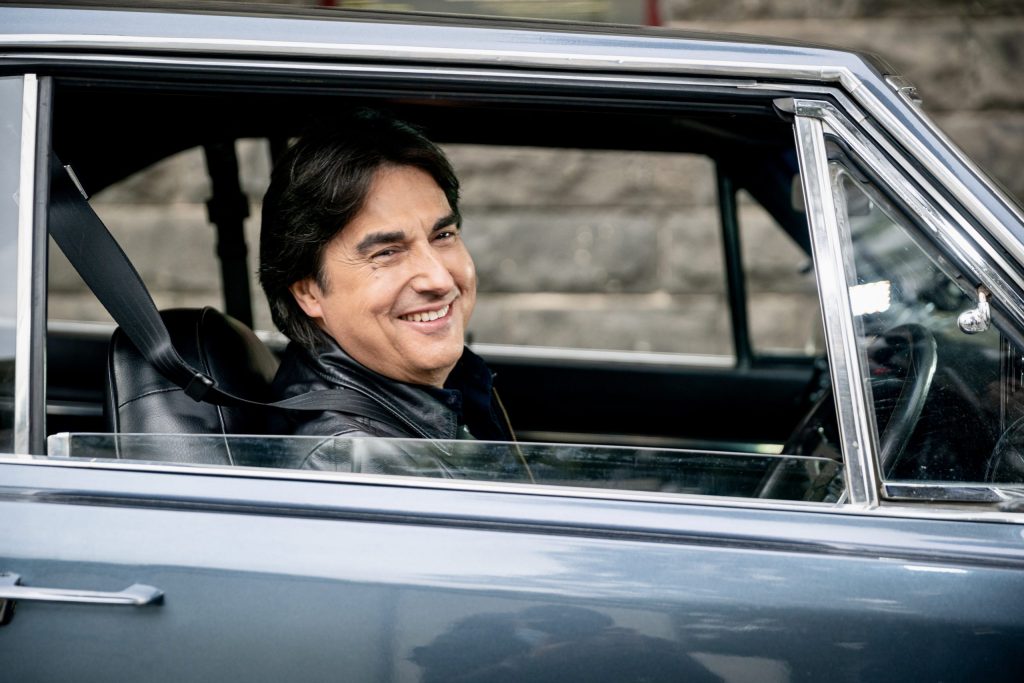
After the sunny adventure of Wog Boys 2: Kings of Mykonos, Steve has fallen on… well, not so much hard times as just fizzled out. Single once again, he’s now a taxi driver who can’t even win a drag race against his former Chrysler Valiant.
Estranged from his best mate Frank (Vince Colosimo) and with his former life firmly in the rear view mirror, it’s hard to see why evil politician Brianna Beagle-Thorpe (Annabel Marshall-Roth) is setting him up for a fall. Oh right: if she doesn’t, there’s no movie.
There are two ways to look at this. As a movie that you have to pay money to see at a cinema, it’s barely worth your time. Giannopoulos is, uh, not a lively comedic lead. The serious moments don’t exactly soar either. Let’s not even go into Steve’s rekindled relationship with his much younger single mum love interest (Sarah Roberts).
The story wanders around a lot without ever settling on much of anything memorable. Subplots come up but are either immediately cut off (Steve’s secret “son”) or just dropped entirely (Frank’s ball-busting wife). There’s a few nods towards the next generation of migrants (and an awkward “yeah, each new generation gets treated like shit, but eventually they’ll accept you” speech), but for the most part this is a trip down an often inadvertently depressing memory lane.
At one stage the plot hinges on literally everyone tuning into an early evening current affairs show (hosted by Derryn Hinch!). The whole thing feels like a throwback to a time when the only way anyone ever watched an Australian movie was by renting the DVD by accident on a Saturday night.
But as an Australian comedy movie, everything retro becomes a strength. Actually, just existing is a strength by the low low standards of recent Australian comedy movies, which makes this…
“The Best Australian Comedy Movie of 2022 – Australian Tumbleweeds”
(feel free to print that out and slap it across the top of the poster at your local cinema – bonus points for putting it on one of those video screens they display posters on so half the time it’s across the poster for Black Adam or The Woman King)
Fifteen years ago, Australian comedy movies were actually trying to be entertaining and funny. Does Wog Boys Forever succeed at this? Of course not – not even close. But at least they made the effort.
Yes, the story is silly and meandering. But each scene follows on from the previous one rather than just repeating it. The jokes are average at best, but there’s enough of them that the occasional one lands. And the whole thing is a comedy first and foremost, not the now-typical lightweight drama where what little comedy there is gets dumped by the third act.
Acting-wise, Colosimo lifts the film a couple of notches every time he’s on screen. Comedy troupe Sooshi Mango are… well, it’s good to see Giannopoulos giving air time to those following in his footsteps (ok, their stakeout sequence got a laugh).
And director Frank Lotito does a surprisingly good job of putting a nicely varied range of Melbourne locations on show. That’s important in a comedy that’s meant to be an exaggeration of actual lived experiences. Wog Boys Forever often looks like a real movie; you can’t say that about every local comedy film.
Probably because in Australia the phrase “local comedy film” is now the biggest joke around.
